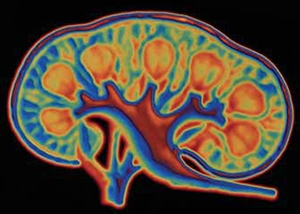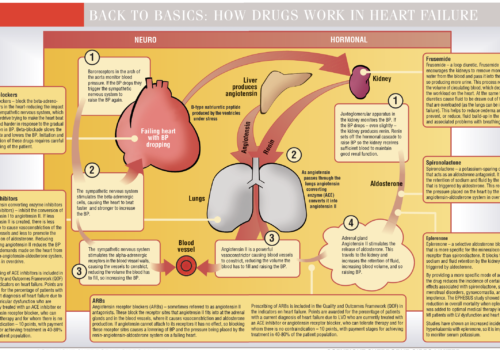Optimising the management of heart failure improves patient survival and reduces hospital admissions. However, standards of care continue to vary, and many HF patients are still not receiving recommended therapy with disease modifying drugs or specialist input to their care. Outcomes will only improve for all HF patients if evidence-based clinical guidelines are implemented throughout the NHS.
Heart failure today: The challenge
Heart failure is an important public health problem that is associated with significant morbidity, mortality and healthcare costs, especially in the over-65s. Despite reductions in HF-related mortality, hospitalisations remain frequent and readmissions continue to rise. It is these admissions to hospital that put a financial strain on the local health economy, and cause stress and anxiety for the patient and supporting family.
Back to Basics: CKD – risk assessment and monitoring
Chronic kidney disease (CKD) is now classified using a combination of estimated glomerular filtration rate (eGFR) and proteinuria measured by albumin:creatinine ratio (ACR). The aim is to more accurately define each patient’s risk of cardiovascular disease and worsening CKD, and to ensure that patients are monitored appropriately.
Back to Basics: Hydration
Good hydration is essential for health, especially for people who may not feel thirsty because of ageing or illness. Maintaining good levels of hydration can prevent or help in treating low blood pressure, urinary infections and constipation. It’s so easy to assess hydration status – this useful guide will help.
Back to Basics: Flu vaccinations 2015-2016
Colder days and longer nights are reminders that the annual winter flu season is here. It’s important to offer flu vaccination to vulnerable patients (young children, the elderly and people with underlying health conditions) to help prevent serious complications. This Back to Basics will help you to make sure that your practice is offering the right flu vaccine.
Going back to basics in cardiovascular disease
Volume 8, Supplement 2, Jul-Aug-Sep 2011
Dietary fats and heart health: Dispelling the myths and consolidating the facts
Volume 5, Supplement 1, September-October 2008
A round table meeting for practice nurses: 7 July 2008, London
Best Practice Principles for Cholesterol Lowering
Volume 4, Supplement 1, May-June 2007
Omega-3 fatty acids: Optimising their use in cardiovascular disease and diabetes
Volume 7, Supplement 2, Jul-Aug-Sep 2010
NICE lipid modification guidelines: Statins for all?
The updated guideline on lipid modification from the National Institute for Health and Care Excellence (NICE), which was published in summer 2014, has continued to cause a great deal of controversy, both among health professionals and the general public. Now that the dust has settled just a little, it is time to review the messages of this guideline in detail rather than relying on the headlines.
The increasing challenge of heart failure: Improving outcomes – Introduction
Despite advances in management, heart failure (HF) remains a deadly clinical syndrome, with a five-year survival of 58% compared with 93% in the matched general UK population. In this comprehensive supplement, my colleagues provide excellent reviews of all aspects of chronic and acute HF, from epidemiology, through diagnosis, lifestyle interventions, pharmacological and device therapies to implementation of current guidelines. Rather than regurgitating the content of their articles, I would like to pick out some areas worthy of thought and discussion. I will discuss challenges to clinicians in the diagnosis and management of HF, diagnostic use of natriuretic peptides (NPs), newer medical therapies and their future use, device therapies, and implementation of the evidence base into clinical practice.
Alcohol: A public health priority
Alcohol has been identified as one of Public Health England’s seven key priorities. After smoking and obesity, it is the biggest lifestyle risk factor for morbidity and mortality in the UK, accounting for 10% of disease and death. An estimated 9 million adults drink alcohol at levels detrimental to their health, with an estimated 1.6 million portraying signs of alcohol dependence. There is a misconception that drinking alcohol will only have a negative impact on health in those who binge drink or regularly get drunk. However, alcohol harms not only the individual drinker but also society as a whole, costing £21 billion a year, including annual direct costs to the NHS of £3.5 billion.



























